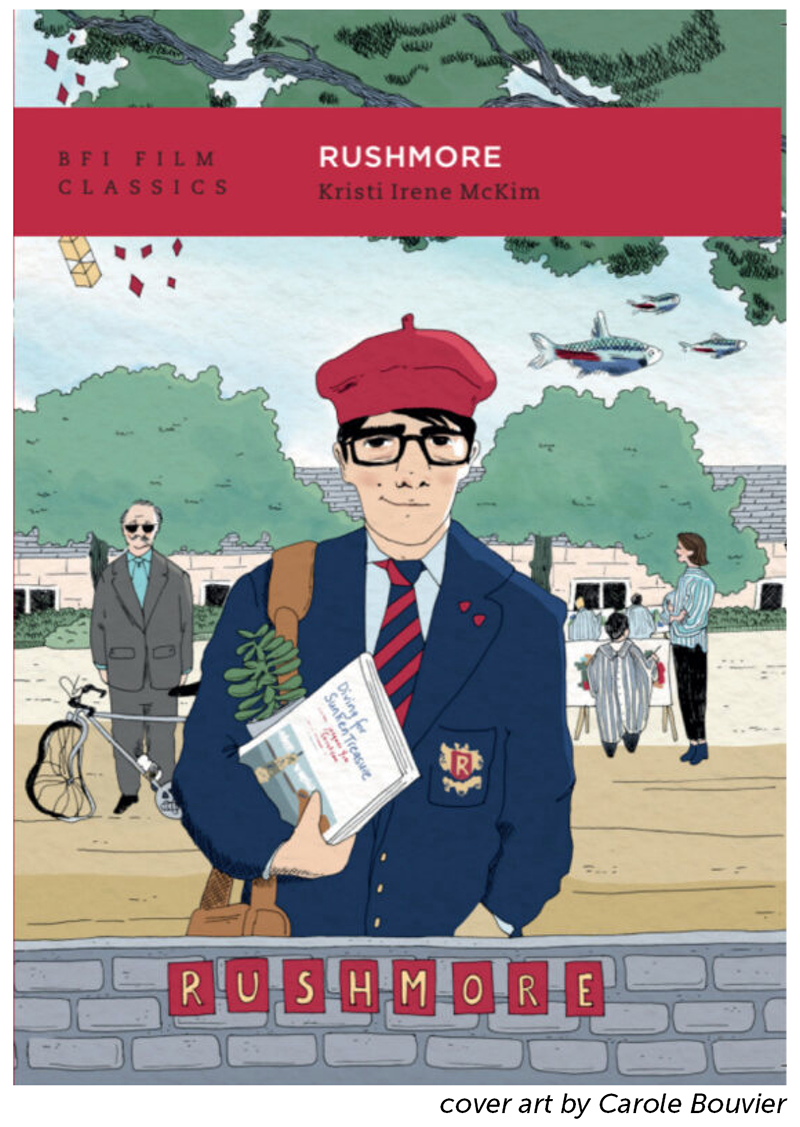Dr.
Kristi McKim’s new work explores Wes Anderson cult classic
 CONWAY, Ark. (October 19, 2023) — Hendrix film studies
professor Dr. Kristi McKim’s new book RUSHMORE was released this month by the British
Film Institute. The new work examines the 1998 cult classic by American
director Wes Anderson and starring Bill Murray. The book is the latest entry in
a line of classic film companion books.
CONWAY, Ark. (October 19, 2023) — Hendrix film studies
professor Dr. Kristi McKim’s new book RUSHMORE was released this month by the British
Film Institute. The new work examines the 1998 cult classic by American
director Wes Anderson and starring Bill Murray. The book is the latest entry in
a line of classic film companion books.
“Kristi McKim’s compelling study of the film argues that
despite the film’s titular call for haste and excess (rush/more), it challenges
a drive toward perfectionism and celebrates the quiet connections that defy
such passion and speed. After establishing Rushmore’s history and
reception, McKim closely reads Rushmore’s energetic musical montages
relative to slower moments that introduce tenderness and ambiguity, in a form
subtler than Max’s desire-built drive or genre-based plays. Her analysis offers
an urgent corrective to what might be perceived as an endearing portrait of
privilege that perpetuates a status quo power. Drawing out Rushmore’s
subtleties that soften, temper, ease, expand, and equalize the film’s zeal, she
reads the film with a generosity learned from the film itself,” according to
promotional information from Bloomsbury.
The book is available through Bloomsbury and Amazon.
McKim’s
connection to the BFI Film Classics series began when she read Salman Rushdie’s
book on The
Wizard of Oz for an undergraduate literature course.
“I couldn’t
believe the exciting new way that Rushdie approached film in ways that I’d only
previously thought possible for literature,” she said. “Over the years, I’ve
taught many books from the BFI Film Classics series, and I also read these
books — beautifully-written, full of fascinating details and broader context —
for pleasure.”
 McKim wrote the book in 2021 during a sabbatical.
McKim wrote the book in 2021 during a sabbatical.
“I wrote this book that
draws from and builds upon the classroom experience of teaching Rushmore while
in a space of remembering the classroom, of conjuring the spirit of
those class meetings, how students usually respond strongly to the film,
somewhere within the trajectory of affection, loathing, delight, bewilderment,
and curiosity,” she explained. “Moreover, I came to appreciate how the film
revises how we imagine learning to look and sound: it is a movie that is
named for a beloved school and that features its protagonist’s move to a new
school, and formal places of education define its structure. Yet learning seems
more to happen outside of actual classrooms, within small gestures and beats of
connection.”
McKim acknowledges a connection between the film
and her own teaching environment at Hendrix College.
“I thought
about how Rushmore
features engaged learning at its best and worst,” said McKim. “[The film’s
protagonist] Max Fischer embarks on what Hendrix might call Odyssey projects;
he has clear goals but questionable means and motives, and I loved writing the
book and thinking about where and how or whether he learns and, further, what
this film about education teaches us, too.”
McKim’s
research included examining newspaper articles to organize the artists’ and
film’s timeline, which proved fascinating. Rushmore’s cowriters
Wes Anderson and Owen Wilson met in college, where they were “rather eccentric
and not exactly model students” and bonded over their shared love of film
history. Rushmore is their second feature film.
“Researching
this history becomes an exercise in registering how the accidental and fortuitous
intersects with the worked-for and desired: Rushmore is both built of
privilege (the Wilson family had key contacts in the film industry, and
Oscar-winning producer James Brooks appreciated how Anderson ‘looks’ like a
genius) and labor, as it is a film about privilege and labor, how
entitlement and hard work do and do not yield desired ends,” said McKim.
“Most
importantly, I came to appreciate how Rushmore is a film about small miracles
and perfect timing, about the way that music can accentuate gestures that
soften sharp edges, that the camera can draw attention to points of
connection,” she said. “My repeated experience of Rushmore led me to feel
wonder at its magic in what cannot be touched but felt, and ephemerally
so. Much of the book thus emphasizes the magical timing between gestures and
music, a way of sensitizing us to subtlety that outshines bolder actions.”
McKim added
that studying Rushmore further led to a new understanding of the
quickness that gives the film such tremendous verve and energy.
“I came to appreciate Rushmore as a film that
celebrates being and having, creatively and communally, not as an escape from
but an exercise of what’s hard and beautiful,” she said.
About Dr. Kristi McKim
Kristi McKim is Professor of English, Film and Media
Studies at Hendrix College, where she has been honored with college-wide awards
for both teaching and advising. She is the author of Rushmore (BFI
Film Classics, 2023), Love in the Time of Cinema (2011)
and Cinema as Weather: Stylistic Screens and Atmospheric Change (2013). Her
published essays range from scholarly to personal, in journals including ISLE:
Interdisciplinary Studies in Literature and Environment, Senses of
Cinema, New England Review, Camera Obscura, and Studies
in French Cinema, and in collections including Screening American
Independent Film;
Mothers of Invention: Film, Media, and Caregiving Labor; and For
the Love of Cinema. Her writing and teaching focus on film’s potential to
enrich and reveal experiences and lives—human and nonhuman—otherwise unseen.
About Hendrix College
Founded in 1876, Hendrix
College is featured in Colleges That Change Lives: 40 Schools That Will Change
the Way You Think About Colleges and celebrated among the country’s leading
liberal arts colleges for academic quality, engaged learning opportunities and
career preparation, vibrant campus life, and value. The Hendrix College
Warriors compete in 21 NCAA Division III sports. Hendrix has been affiliated
with the United Methodist Church since 1884. Learn more at www.hendrix.edu.
“… Through
engagement that links the classroom with the world, and a commitment to
diversity, inclusion, justice, and sustainable living, the Hendrix community
inspires students to lead lives of accomplishment, integrity, service, and
joy.”
—Hendrix College Statement of Purpose